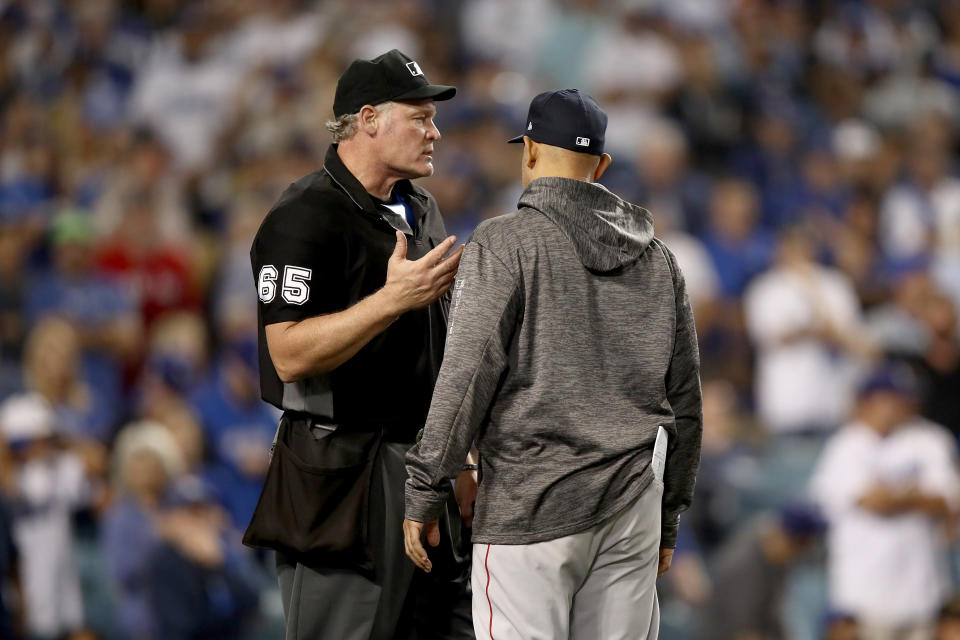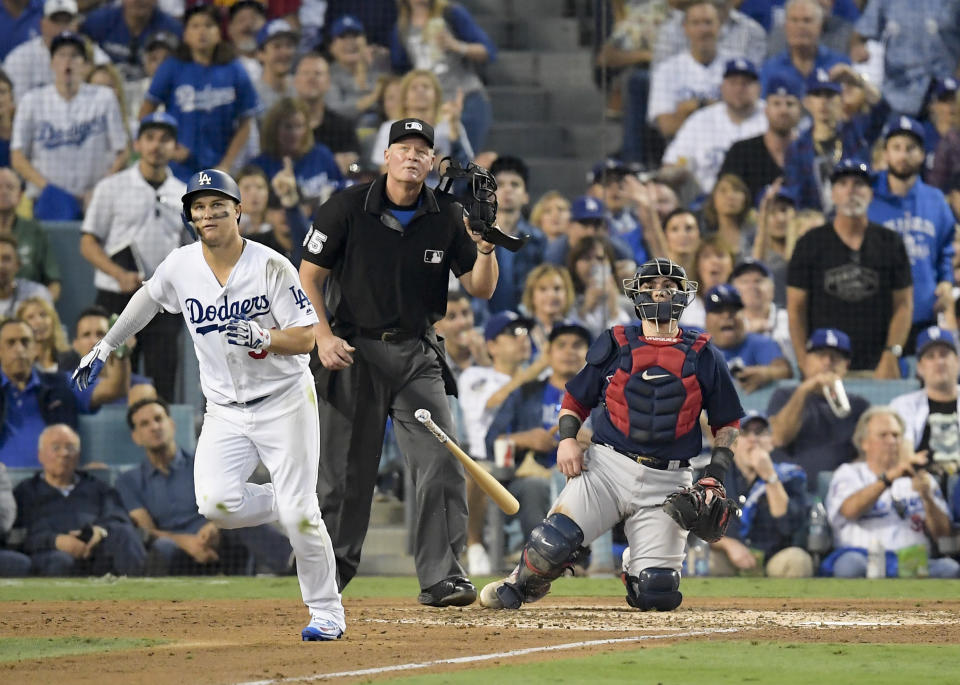Here's what it's like to umpire the longest postseason game in MLB history
LOS ANGELES – Moments after he’d put one last baseball into play, watched that fly, then stayed just long enough to ensure Max Muncy completed his journey, Ted Barrett, the plate umpire for Game 3 of the World Series, was offered for his first meal in many hours the choice of steak or fish.
“I had both,” he said.
Not 15 hours later, he was again in a room behind the Dodgers dugout with his five crewmates.
He had the corner locker. Fieldin Culbreth, who’d manned left field the night before, sat beside him. They’d slept for four or five hours after what had become an 18-inning game, seven hours and 20 minutes of standing and decision-making and hydrating and focusing and settling disputes. A lot of standing. For Barrett, a lot of standing and squatting — 561 pitches’ worth.
The room had a refrigerator, a desk and a leather couch. The other umpires were at their lockers. League officials – Joe Torre, Peter Woodfork and Randy Marsh among them — held conversations in the center of the room. There were coffee cups, paper plates, water bottles and sunscreen canisters about the place, along with the gear the umpires would wear to the field in about an hour for Saturday’s Game 4.
Barrett, umpiring his fourth World Series, would be in right field for Game 4.

By any analysis, he’d had a rigorously excellent Friday night. If he’d missed a handful of balls and strikes, they’d been barely arguable. Under the pressure of a late October game, in an era when everyone is an amateur umpire and has the video to verify it, Barrett had not simply performed during a World Series game, he’d performed for the longest World Series game in history, both in time and innings.
He felt it in his feet. In his legs. In his appetite. And in the ease in which he fell asleep after the game. Over those nearly 7 ½ hours, he’d not sat down. He’d taken one bathroom break, that after the 14th inning. Otherwise, he’d stood behind the plate, and he’d gotten low in his wide squat, and he’d dealt with those 561 pitches, one at a time, and then he’d stood from his wide squat.
“I was surprised it was that few,” Culbreth said with a smile.
Barrett laughed at that. It had been a long night for everyone. Only six of them never sat down. Never left their spots. They wore blue. The game went through more than 300 baseballs, those delivered to Barrett a handful at a time by Dodgers ball boy Javier Herrera.
“The kid running balls yesterday, I could tell he was gassed,” Barrett said with admiration for Herrera. “Just about the 14th. He did a wonderful job. In addition to that, I almost felt guilty because I was asking him for waters and other things and he ran and got him. I thought, ‘Oh my gosh, he’s earned his money tonight.’
“Usually I call for three balls. He’ll bring three or four. And then at the end of every inning he’s reloading us and he’s taking water out to the base guys. So that’s the MVP last night for our crew.”
At, say, three balls at a time, that’s at least 100 round trips, dugout to plate and back.
Barrett, 53, became a regular major league umpire in the American League in 1994. A large man, he’d been a football and basketball player and an amateur boxer of some note in his youth. He regularly sparred with elite heavyweights, which, presumably, hastened his entry into umpiring.
“I’ve taken a beating, physically, before,” he said, laughing. “This is a lot easier, physically. I’m a better umpire than I was a sparring partner.”
Which is not to say it’s easy.
“The physical part of it is hard just because of the squatting, the up and down behind the plate, with your legs and your muscles,” he said. “But we prepare for it. Now a major league game is 3 ½, sometimes four, hours, so we prepare for that. We try to get our rest and try to work out and get ready for a long game. But the mental part is really tough, because you’ve got to concentrate. It’s just complete concentration every pitch, just staying in the moment and fighting any temptation to let your mind wander. You just have to stay locked in. That’s hard enough during a regular major league baseball game. But now to add the length of that and the magnitude of it, makes it really difficult. Afterward, mentally, you’re able to sit down and finally relax and start to realize that for seven hours you’ve been grinding.”
In order to remain sharp hour after hour after hour, Barrett, an ordained minister with a doctorate in theology, recited verses in his head. His favored Friday night: “I can do all things through Christ that strengthens me.”

Otherwise, he summons the words of former coaches.
“Hey, this is go time,” he recalled. “Suck it up. You gotta get it done.”
Said Culbreth: “For me, I can tell you that last night was no different than 2 ½ months ago. Between innings, you can relax a little bit, talk about things with your partners out there. But the minute the [inning] clock runs out, Ted puts the ball in play, for me I just check back in. That’s just what I do. I don’t care if it’s April or 18 hours ago.”
The night had been so long, the day had gone so swiftly, the next game had come so abruptly, Barrett hadn’t the chance to determine how he’d been graded by the league’s system. He’d simply reported back to work, started over, went and stood somewhere else for a few hours.
“We’re professionals,” he said. “We walk off the field and we want to be perfect and it’s just not possible. We get our zone evaluations and it was such a quick turnaround I haven’t had a chance to look at it yet. I’m anxious to see that. But I feel pretty good about the job I did.
“I think I did a good job. Two good teams playing hard. They were very respectful any time they did disagree. So, that part was nice to work. Because it’s not always that way.”
More from Yahoo Sports:
• Four Jags players detained after altercation at London nightclub
• Viral FSU fan explains what he was doing during Clemson game
• LeBron shows support for senate hopeful with wardrobe choice
• Watch ASU’s N’Keal Harry make crazy OBJ-esque catch

